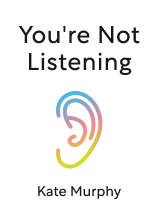

This article is an excerpt from the Shortform book guide to "You're Not Listening" by Kate Murphy. Shortform has the world's best summaries and analyses of books you should be reading.
Like this article? Sign up for a free trial here.
What’s the difference between simply hearing and effectively listening? What are you missing by not listening well?
Kate Murphy’s You’re Not Listening: What You’re Missing and Why It Matters makes a case for the value of listening more effectively. She argues that people are struggling to pay attention to each other, largely thanks to our self-centered culture, technological distractions, and a toxic political atmosphere.
Continue reading for an overview of this important book.
Overview of You’re Not Listening
Kate Murphy’s You’re Not Listening: What You’re Missing and Why It Matters contends that our failure to listen well to each other carries a host of detrimental effects. These include loneliness, damaged mental health, and increased hostility and misunderstanding between people of different beliefs.
Fortunately, these problems can be reversed if we learn to listen effectively. We’ll explain how effective listening differs from simply hearing and what steps you can take to become a more effective listener. We’ll cover Murphy’s ideas in three parts:
- Part 1: The Value of Effective Listening explains Murphy’s definition of effective listening and explores its value in building relationships, encouraging personal growth, and increasing social cooperation.
- Part 2: Barriers to Effective Listening discusses Murphy’s reasons why people have such a hard time listening to each other—such as distractions, discomfort, and incorrect assumptions.
- Part 3: How to Listen Effectively digs into Murphy’s advice on how you can improve your listening skills.
Part 1: The Value of Effective Listening
Most people understand listening as simply hearing someone talk. However, Murphy advocates a more developed model of listening that we’ll call effective listening. Effective listening goes far beyond merely processing someone’s words. It requires prioritizing the speaker and helping them feel heard. It requires reading their body language, encouraging them to continue sharing, and putting your assumptions aside. Effective listening includes trying to understand how the speaker is feeling and why they’re trying to share something with you.
Many find effective listening challenging. But, according to Murphy, it’s well worth the effort. She notes three main benefits of effective listening: creating connections, fostering growth, and enabling cooperation.
Benefit #1: Effective Listening Creates Connections
Murphy explains that effective listening creates empathic connections between people. Scientific research shows that listening causes the brain waves of both the listener and speaker to start mirroring each other. This attunement creates strong feelings of personal connection that enable both speaker and listener to feel each others’ emotions and develop an empathic bond. Murphy explores three core benefits of these empathic connections.
1) Creating Connections Alleviates Loneliness
Creating connections has the power to help us overcome loneliness. Murphy explains that people feel lonely when they’re emotionally disconnected from others. This could be either because they’re physically isolated, or because they’re unable to connect with others around them. Because effective listening forges empathic connections at the neurological level, it has the power to alleviate emotional isolation and loneliness.
2) Creating Connections Strengthens Intimate Relationships
Strong connections have the power to build more satisfying intimate relationships. Murphy explains that the deeper connections that come from effective listening enable trust: People are more likely to trust someone if they believe that person understands their feelings. Because effective listening allows you to understand someone else’s feelings on a deeper level, this will increase the likelihood that they’ll trust you.
Furthermore, Murphy states that trust is one of the most important foundations for a satisfying romantic relationship. Relationships without this foundation are more likely to fail.
3) Creating Connections Supports Healthy Development in Children
By forging strong connections through effective listening, parents can help their children grow into healthier adults. Murphy explains that children need to feel heard to build trusting relationships with their parents. When children grow up, their relationships with their parents will form the template for their future relationships with others. Children who don’t form strong connections with their parents may struggle to form strong connections with others later in life.
Benefit #2: Effective Listening Fosters Growth
Murphy explains that, beyond creating strong connections, effective listening leads to learning and growth for both the listener and the speaker.
1) Effective Listening Helps the Listener Learn and Grow
Listening to others helps you learn more about people and the world around you—leading to a more interesting life with more personal growth. Murphy states that when you talk about yourself, you’re only talking about things you already know. However, when you listen to others, you also get to hear about things you don’t already know. This has the potential to help you grow in three ways.
1) By considering ideas that wouldn’t have occurred to you, you develop new perspectives and come to new understandings that you wouldn’t have reached on your own.
2) Discovering new points of view allows you to challenge your own beliefs. This has the power to help you discover errors in your thinking and make you more secure in your convictions. Murphy explains that we’re most afraid of our ideas being challenged when they’re untested. By testing your own beliefs, you can become less afraid of these challenges. This will actually make you more secure in your beliefs because you know they can stand up to challenge.
3) Listening to others can enrich your inner voice. People’s inner voices typically pull from the voices they’ve listened to throughout their lives—such as parents, teachers, or close friends. By listening effectively to people, you can bring a greater variety of perspectives and wisdom to this inner voice.
2) Effective Listening Helps the Speaker Learn and Grow
Murphy also states that being effectively listened to can help the speaker learn and grow by providing an opportunity to process and solve their own problems. Recall that listening builds trust between both parties. When the speaker feels they can trust their listener, it allows them to open up and explore their thoughts and feelings in greater depth.
By talking about their feelings in greater depth, the speaker has the opportunity to process problems, see new solutions, or come to a deeper understanding of themselves. All of these can aid the speaker in their personal growth by helping them to better understand their needs and challenges in life.
Benefit #3: Effective Listening Enables Cooperation
Finally, Murphy argues that listening enables cooperation. Recall that effective listening allows the speaker to open up and share things they might not normally share. This helps the listener and speaker find common ground and discover opportunities for compromise—which, in turn, allows for greater cooperation, collaboration, and coalition-building.
Part 2: Barriers to Listening
If listening is so important and beneficial, then why aren’t people doing it? Murphy identifies four main barriers to effective listening: distracting technology, discomfort, a culture of self-centeredness, and assumptions about other people.
Barrier #1: Distracting Technology
Murphy argues that people don’t listen well because they’re distracted. She explains that people are prone to distractions because the human brain thinks much faster than people speak. Therefore, you can easily get bored with someone speaking and focus on something else.
While listening without distraction may be difficult under normal circumstances, Murphy suggests that two recent developments in technology have made this problem even worse: increased background noise and technology designed to distract.
1) Increased background noise breaks the listener’s concentration. Murphy contends that we live amid higher levels of background noise than ever before. In public and private spaces, people are used to constant music or television playing in the background. This pulls people’s attention away from their conversations.
2) Technology is designed to distract. Murphy states that many software companies use information about psychology and neuroscience to design apps that are hyperstimulating and addictive. This distracts people because they’re always tempted to check their apps. Furthermore, these apps condition people’s brains to crave a higher level of stimulation. This makes it even harder to pay attention as normal conversations won’t be as stimulating.
Barrier #2: Discomfort
Murphy points out many people have trouble listening because they find it uncomfortable. She highlights two distinct ways listening makes people uncomfortable: It forces them to deal with uncomfortable silences and it exposes them to views that challenge their beliefs.
1) Uncomfortable Silences
Murphy explains that listening causes discomfort because it requires you to be silent—and many people find that silence distressing. Therefore, many people try to fill up the silence by talking. The pressure to avoid silence creates two problems for effective listening.
- To avoid silence, listeners will often think about how they’ll respond when the other person finishes talking instead of paying attention.
- Listeners will also jump in and speak as soon as they notice a pause coming up—whether or not the other person has finished speaking. This prevents the speaker from finishing their thoughts and sharing what’s on their mind.
2) Views That Challenge Your Beliefs
Murphy asserts that listening can also be uncomfortable because it exposes you to views that challenge your beliefs. Citing research, she says confronting views contrary to your own activates the same parts of the brain as physical danger. Therefore, listeners may steer the conversation away from uncomfortable topics or avoid listening to certain individuals altogether. This leads people to listen to each other less on topics they find uncomfortable.
Barrier #3: A Self-Focused Culture
Murphy explains that people also don’t listen to each other because their culture encourages them to be self-centered. Society teaches that in order to belong and to deserve others’ attention, people need to prove their worth by displaying it to others. This encourages people to talk more about themselves during conversations instead of listening to others.
Murphy notes that, paradoxically, talking about yourself all the time may diminish your feelings of worth. Recall that listening to others creates a sense of empathy and connection. Many people derive their sense of self-worth and belonging from these feelings—but if someone always talks instead of listening, that essential feeling of connection can’t happen. Therefore, in trying to display their worth all the time, someone may feel less self-worth and belonging than if they gave others a chance to speak.
Barrier #4: Making Assumptions
Murphy states that people also fail to listen effectively because they’ve formed assumptions about the person speaking. When you rely on your assumptions about others, you become less curious about who they are and what they have to say. This will lead you to listen less—there’s no need to listen if you already know what they’ll say. Therefore the assumptions listeners hold about the person speaking become an obstacle to effective listening. Murphy identifies two main reasons why people make assumptions: stereotyping and personal familiarity.
- Stereotyping occurs when someone makes assumptions about another person based on external characteristics or social categories. Murphy points to a common modern example of this: assuming that someone has bad morals or character because of the political camp they fall into.
- Paradoxically, knowing someone really well can make you listen to them less. This happens because when you feel you know someone very well already, you become less curious about them and believe that you have less to learn. This lack of curiosity leads listeners to “tune out” when someone is speaking and therefore listen less effectively.
Part 3: How to Listen Effectively
Murphy says that, fortunately, you can overcome the barriers standing in the way of understanding others and become a more effective listener. We’ve grouped Murphy’s suggestions into three main categories: Stay curious, respond well, and pay close attention to the person speaking.
Suggestion #1: Stay Curious About the Person You’re Listening To
To start listening more effectively, Murphy argues you should prioritize being curious about the other person. Focus on the things you don’t know about the speaker and the possibilities for learning. She provides two strategies for fostering curiosity: Make room for the unexpected and notice your own thoughts and feelings.
1) Make Room for the Unexpected
Murphy argues that when a listener assumes they already know where a conversation is going, this undermines their curiosity. By staying open to the possibility of an unpredictable or surprising conversation, a listener can stay curious about the person speaking.
2) Notice Your Own Thoughts and Feelings
Furthermore, Murphy recommends that you notice your own thoughts and feelings while listening to someone. For example, you may feel under attack if someone’s views contradict yours. This could lead you to react with anger or disgust instead of curiosity. By paying attention to yourself, you can notice these emotional responses and choose to stay curious.
Suggestion #2: Respond in Ways That Encourage Sharing
Murphy states that you can become a more effective listener through your responses to the person speaking. Specifically, she recommends finding responses that encourage the speaker to continue sharing. In this section, we’ll explore nonverbal and verbal responses that can encourage a speaker to share.
1) Nonverbal Responses That Encourage Sharing
To start, Murphy recommends that you adjust your nonverbal communication to show you are listening. Maintaining strong eye contact and a relaxed posture comes across as inviting and encourages sharing.
Also, allow for pauses in the conversation instead of speaking as soon as the other person stops. This gives the other person time to get their whole thought across—which is important because people often don’t say exactly what they mean on their first try. Additionally, encountering a pause often prompts a speaker to elaborate on their point, sharing details they may not have shared otherwise.
2) Verbal Responses That Encourage Sharing
Murphy identifies two types of responses that encourage sharing: open-ended questions, and assisting responses.
Open-ended questions allow the speaker to direct the conversation—in contrast to closed-ended questions that steer the conversation in a particular direction. By asking open-ended questions, you can encourage the other person to speak freely about whatever they want.
For example, if someone tells you about getting lost while traveling abroad, you could ask an open-ended question like, “How did you react?” instead of a closed question like, “Did you have a map?” The first question allows the speaker to choose the direction of the conversation, while the second one narrows the conversation to a detail chosen by the listener. Assisting responses encourage and help the speaker in sharing. We assist someone in sharing when we ask questions that encourage them to elaborate on what’s most important to them. Murphy contrasts this with a redirecting response, which steers the conversation away from what they’re trying to share.
Suggestion #3: Pay Close Attention to the Speaker
You can also become a more effective listener by paying close attention to the person speaking. Murphy states that you’ll notice much more about what they’re communicating. Speakers reveal a lot through nonverbal communication and word choice. By paying attention to more than their words, you can learn how the speaker is feeling and why they want to share something.
Optimize Your Attention: Resist Distractions
To pay close attention, Murphy stresses the importance of resisting distractions. If you’re mainly distracted by external things, you can alter your environment to minimize the potential for distractions. For example, if you know your phone will be a distraction, you can turn it off. If you’re mainly distracted by internal things, such as boredom, you’ll have to be aware of this tendency and choose to pay attention to the speaker.
Murphy suggests that when you do get distracted, you should ask the other person to repeat themselves. While it may feel uncomfortable to admit you became distracted, the repetition ensures that you understand them more than if you just guess what they said based on context.
Suggestion #4: Be Aware of Your Limitations
Lastly, Murphy recommends that listening effectively requires you to understand your limitations and emotional capacity. Attention is a finite resource, and paying close attention to someone drains people too much to do it all the time. Your life will also involve time-sensitive obligations that may be more important at the moment than listening.
If you try to listen when you don’t have the time or emotional energy to listen, you won’t listen effectively. The other person will notice this and won’t feel understood, and neither of you will feel connected. Instead of trying to simply power through your limits, you should set boundaries for yourself by giving yourself permission to postpone or altogether avoid listening when necessary.

———End of Preview———
Like what you just read? Read the rest of the world's best book summary and analysis of Kate Murphy's "You're Not Listening" at Shortform.
Here's what you'll find in our full You're Not Listening summary:
- A look at how listening skills are disappearing throughout society
- How to become a better, more effective listener
- Why it's easier to listen to strangers than to those close to you






